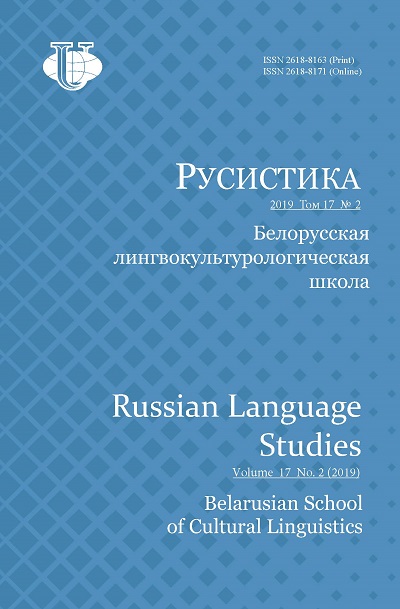The role of a language in the world’s conceptualization: the aspect of cultural linguistics
- Authors: Maslova V.A1
-
Affiliations:
- Vitebsk State University named after P.M. Masherov
- Issue: Vol 17, No 2 (2019): Belarusian School of Cultural Linguistics
- Pages: 184-197
- Section: Cultural Linguistics: Theoretical and Applied Aspects
- URL: https://journals.rudn.ru/russian-language-studies/article/view/21114
- DOI: https://doi.org/10.22363/2618-8163-2019-17-2-184-197
Cite item
Full Text
Abstract
The transition from actual knowledge to the deep one is an important characteristic of all modern humanities, including cognitive linguistics and cultural linguistics. Study of deep knowledge is urgent now. The purpose of the article is to show that the allocation of language categories is a complex integrative process, since the category itself includes both general conceptual bases for combining objects having common essential properties, and knowledge of the rules and mechanisms of such combination. The author concluded that the concept of “language and culture” converge the interests of all sciences that study human beings. Therefore, modern cultural linguistics should explore not only the interaction of language and culture, but also the relationship and interconnections of language and personality, its consciousness and thinking. The article shows certain examples of language meaning in world conceptualization and categorization. It attempts to establish objective and subjective factors shaping the national world picture. One of these factors is the metaphor, which clearly reflects the national specificity of the world perception.
About the authors
Valentina A Maslova
Vitebsk State University named after P.M. Masherov
Author for correspondence.
Email: mvavit@tut.by
PhD (Philology), Associate Professor of Vitebsk State University named after P.M. Masherov (Vitebsk, Republic of Belarus). Research interests: cultural linguistics, world’s conceptualization, cognitive linguistics
33 Moskovskiy Prospekt, Vitebsk, 210038, Republic of BelarusReferences
- Babenko, L.G. (2010). Kontseptosfera russkogo yazyka: klyuchevye kontsepty i ikh reprezentatsii (na materiale leksiki, frazeologii i paremiologii) [The conceptual sphere of the Russian language: key concepts and their representations (on the material of lexis, phraseology and paremiology)]. Ekaterinburg. (In Russ.)
- Berestnev, G.I. (2017). Sinkhronistichnost’ kak ob’ekt kognitivnoi lingvistiki [Synchronicity as an object of cognitive linguistics]. Dukhovnost’ i mental’nost’: ekologiya yazyka i kul’tury na rubezhe ХХ-ХХI vekov [Spirituality and mentality: the ecology of language and culture at the turn of the XX-XXI centuries]. Lipetsk. (In Russ.)
- Boldyrev, N.N. (2009). Kontseptual’naya osnova yazyka [The conceptual basis of language]. Kognitivnye issledovaniya yazyka. Vypusk IV. Kontseptualizatsiya mira v yazyke [Cognitive studies of language. Issue IV. Conceptualization of the world in language]. Moscow; Tambov: RAN; TGU Publ. (In Russ.)
- Chernigovskaya, T.V. (2016). Cheshirskaya ulybka kota Shredingera: yazyk i soznanie [Schrödinger’s cheshire smile: language and consciousness]. Moscow: Yazyki slavyanskoi kul’tury Publ. (In Russ.)
- Gak, V.G. (1998). Metafora: universal’noe i spetsificheskoe [Metaphor: Universal and Specific]. Yazykovoe preobrazovanie [Language Transformation]. Moscow: Shkola “Yazyki russkoi kul’tury” Publ. (In Russ.)
- Karasik, V.I., & Sternin, I.A. (2007). Antologiya kontseptov [Anthology of concepts]. Moscow: Gnozis Publ. (In Russ.)
- Karaulov, Yu.N. (2003). Russkii yazyk i yazykovaya lichnost’ [Russian language and language personality]. Moscow: Editorial URSS. (In Russ.)
- Kluckhohn, F.R., & Strodtbeck F.L. (1961). Variations in value orientations. Evanston, Illinois: Row, Peterson.
- Kovshova, M., & Gudkov, D. (2017). Slovar’ lingvokul’turologicheskikh terminov [Dictionary of cultural linguistic terms]. Moscow: Gnozis Publ. (In Russ.)
- Lakoff, Dzh., & Dzhonson, M. (1990). Metafory, kotorymi my zhivem. Teoriya metafory [Metaphors we live by. Theory of metaphor]. Moscow: Progress Publ. (In Russ.)
- De Mauro, T. (2000). Vvedenie v semantiku [Introduction to semantics]. Moscow: Dom intellektual’noi knigi Publ. (In Russ.)
- Ortega y Gasset, J. (1990). Dve glavnye metafory [Two main metaphors]. Moscow. (In Russ.)
- Teliya, V.N. (2005). O fenomene vosproizvodimosti yazykovykh vyrazhenii [About the phenomenon of reproducibility of linguistic expressions]. Yazyk, soznanie, kommunikatsiya [Language, consciousness, communication], 30, 4-42. Moscow: MAKS Press Publ. (In Russ.)
- Vitgenshtein, L. (1994). Logiko-filosofskii traktat [The logical and philosophical treatise]. Filosofskie raboty [Philosophical work]. Moscow: Gnozis Publ. (In Russ.)
- Yartseva, V.N. (1990). Lingvisticheskii entsiklopedicheskii slovar’ [Linguistic Encyclopedic Dictionary]. Moscow. (In Russ.)
- Zvegintsev, V.A. (1996). Mysli o lingvistike [Thoughts on linguistics]. Moscow: MSU Publ. (In Russ.)
- Pivavar, K. (2015). Belaruskaya mental’nasts’ u mounai prastory mastatskaga tekstu [Belarusian mentality in the language of an artistic text]. Vitsebsk: VGU Publ. (In Belarus.)















